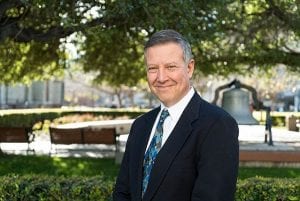
Photo: Brandon Chew
Marc d’Alarcao, the former associate dean of research for the College of Science and professor of chemistry, has been appointed as the interim dean for the newly created College of Graduate Studies.
As a professor of chemistry with 30 years of experience in higher education split between San José State University and Tufts University, Marc d’Alarcao said his favorite part of teaching is when he sees students begin to understand how new knowledge is created.
“Knowledge is always continuing to grow,” he said.
Now d’Alarcao will be essential in creating a new college at SJSU as the interim dean of the College of Graduate Studies, designed to support graduate students in a variety of ways, including in advancing their fields through their research, scholarship and creative activities.
“We have a very large graduate student population of about 8,000,” he said. “They deserve to have an advocate who is solely focused on their needs.”
Interim Provost and Senior Vice President for Academic Affairs announced the creation of a new College of Graduate Studies in fall 2018.
“The creation of a College of Graduate Studies has been front and center inAcademic Affairs for well over a year and a half,” Interim Provost and Senior Vice President for Academic Affairs Joan Ficke wrote in a January announcement about d’Alarcao’s appointment. “It dovetails with increasing commitments to our faculty administering graduate programs, and to our substantial graduate students’ population. It also signifies our re-visioning what SJSU contributes to Silicon Valley and to the world beyond.”
At Tufts, d’Alarcao mentored graduate students, including both master’s and PhD candidates, and regularly involved students at all levels in his research. His work at both universities has focused on biological and medicinal chemistry including the design and synthesis of potential antitumor agents, and a study of insulin action by synthesis of molecules related to insulin signal transduction with potential utility as treatments for type II diabetes mellitus.
“The thing that attracted me to SJSU was the outstanding faculty and students,” he said.
He has been working to expand research, scholarship and creative activities since his arrival at SJSU–as a faculty member, as a member of the AcademicSenate, and most recently, as the associate dean of research for the College of Science.
“Marc is an excellent choice to lead the College of Graduate Studies,” said Michael Kaufman, dean of the College of Science. “He has deep knowledge of the university and great skill in leading transformation both within and beyond college boundaries. His thoughtful approaches to challenges and opportunities make him the ideal person to enhance and expand SJSU’s graduate educational endeavors.”
Aside from advocating for graduate students, d’Alarcao articulated a few other reasons the new college is essential to the university’s priorities. First, he said it will continue to enhance research, scholarship, and creative activity, especially engaging graduate students. Second, it will position SJSU to expand its doctoral offerings — the university currently offers a doctorate in education and a doctor of nursing practice. Lastly, it will serve as a platform to better highlight the extraordinary work of our talented graduate students, both for internal and external audiences.
“For graduate students, success often means excellence in research or creative activity,” he said, adding that many of SJSU’s graduate programs require the generation of new knowledge or other creative products as a central component of the students’ experience.
d’Alarcao received a bachelor’s degree in chemistry from Bridgewater State College, in Massachusetts, during which he worked as a research assistant in microbiology at the University of Massachusetts Medical School in Worcester. He completed his PhD in organic chemistry at the University of Illinois Urbana-Champaign, followed by postdoctoral studies at Harvard University under the mentorship of E. J. Corey, who would later become a Nobel laureate.